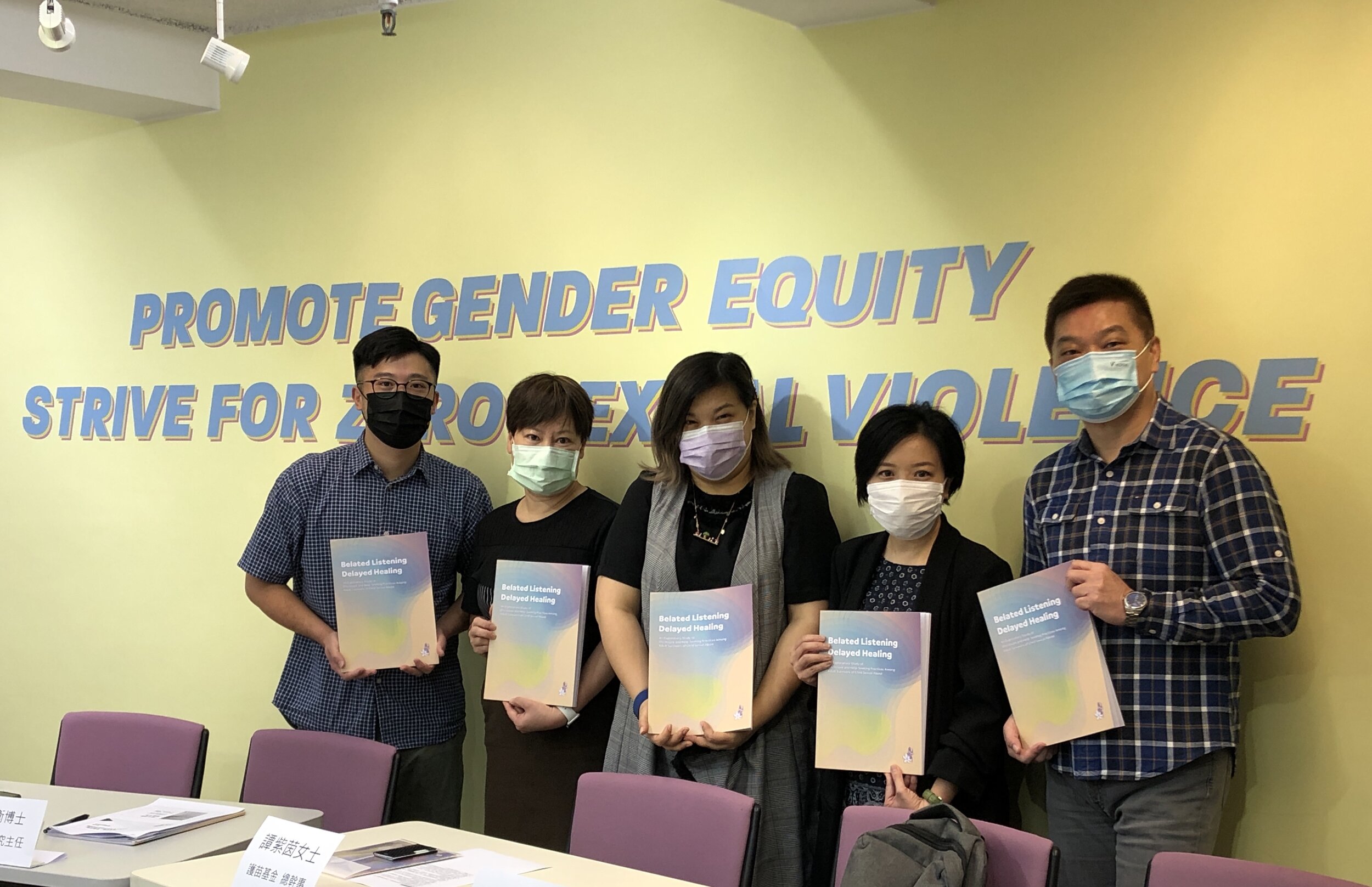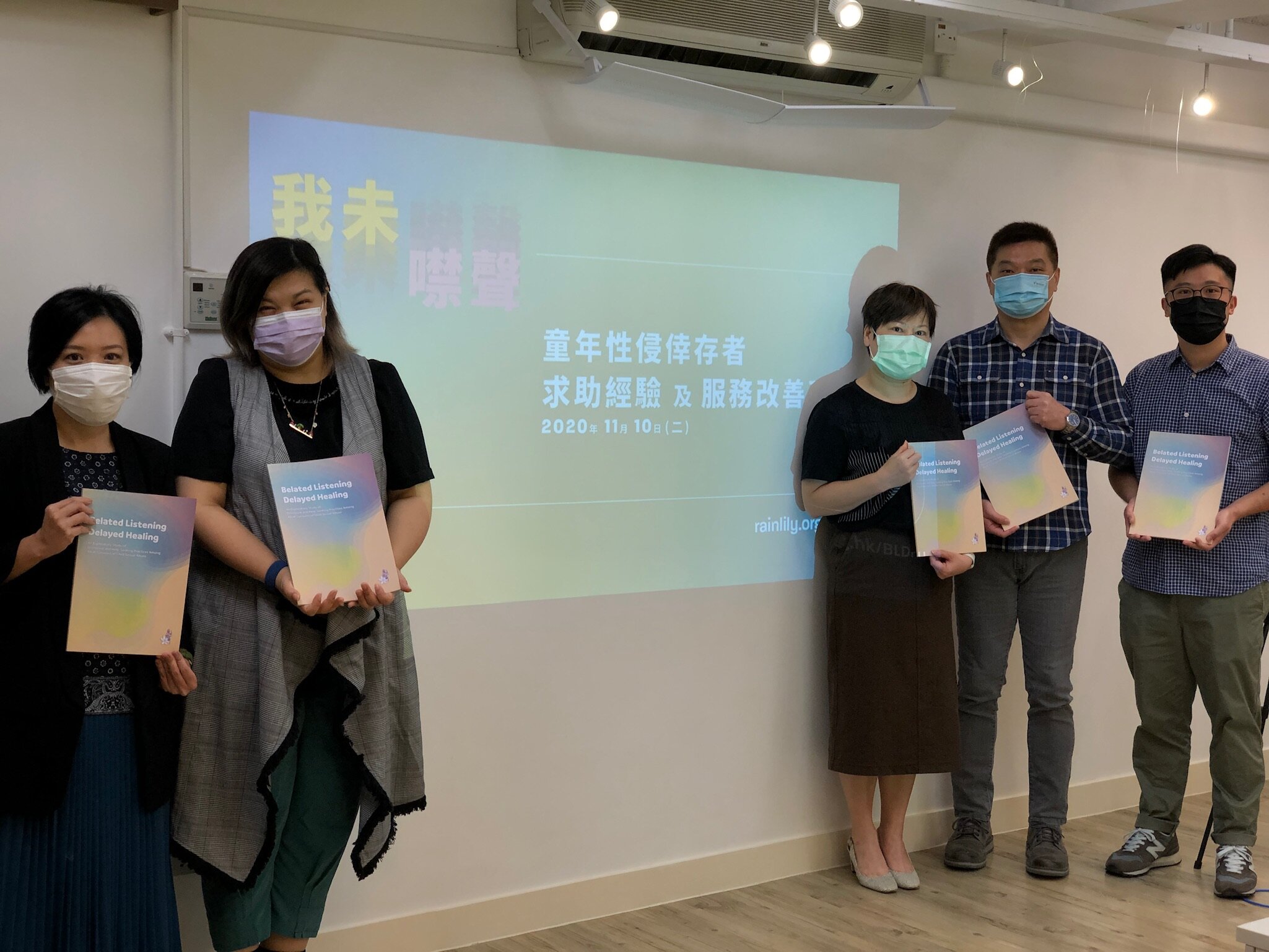RainLily Study Uncovers Traumatic Experiences in Disclosure and Help-seeking for Survivors of Child Sexual Abuse
AT THE REPORT LAUNCH SEMINAR FOR
'Belated Listening, Delayed Healing – An Exploratory Study of Disclosure and Help-Seeking Practices
Among Adult Survivors of Child Sexual Abuse'
RainLily, the first sexual violence crisis centre in Hong Kong, today (10 November 2020) launched a major report, 'Belated Listening, Delayed Healing – An Exploratory Study of Disclosure and Help-Seeking Practices Among Adult Survivors of Child Sexual Abuse' at the report launch seminar held online.
Following the publication of RainLily Retrospective Study 2000-2018 last year, which revealed an average of 13.2 years delay in presentation if the survivor was under the age of 16 years when being assaulted. The average presentation delay of these Child Sexual Abuse (CSA) survivors was ten times longer than their adult counterparts, which overtly points to the greater vulnerability of children and teenagers in handling sexual abuse incident. Given these results, RainLily research team has thereby conducted an exploratory study through qualitative research approach to elicit and analyse survivors' retrospective narratives of their disclosure and help-seeking experience. With the support from RainLily's counsellors and service users, 16 adult survivors of CSA were recruited and were invited for a semi-structured interview.
Albert Yau, RainLily's Research Officer, introduced some key findings of the study at the seminar:
1. Early disclosure experiences in childhood
In examining survivors' disclosure decision during childhood, this present study found that around one-third of total informants never talked about their abuse to any person until adulthood. A range of inhibitors were identified, such as difficulties in naming the problem and fear of the consequences of disclosure. More importantly, more than two-thirds of total informants did attempt to disclose their CSA incident during childhood, either directly or subtly. Yet, effective follow-ups of their cases were rarely achieved, inflicting further trauma on survivors. Based on informants' narratives, multiple patterns of confidants' response were identified, including neglecting survivors, doubting and blaming survivors, and not knowing how to help the survivors.
In the face of negative and/or unsupportive responses, many of the respondents refrained from revealing further details of the case until adulthood. This present study thereby raises the issue of mishandling of survivor disclosures by recipients. In order to facilitate a survivor's recovery, appropriate measures must be made to improve a potential confidant's handling of disclosure.
2. Multiple disclosure experiences in adulthood
Apart from their disclosure experiences in childhood, this present study also finds that all 16 informants did disclose their traumatic experiences in adulthood, furthermore, nearly all of them reported multiple experiences of disclosing the abuse. Yet, the incentives of each disclosure actions varied from case to case, ranging from a wish to merely tell a person about the incident to a wish to seek more formal validation and support, from an attempt to share their secret with loved ones to an attempt to confront the abuser face to face, and from an aspiration to speak up for themselves to an aspiration to stand up for other survivors in effecting social change.
With respect to their disclosure experiences, this present study reaffirms the notion that survivors' disclosures must be understood as a complex and life-long process instead of a one-off or single event. Meanwhile, survivors' multiple disclosure experiences also denote a transformation underlying their handling of the trauma over time. Although there is no standard disclosure trajectory for survivors, this present study put forward that each of these disclosure experiences is, nevertheless, crucial to survivors' recovery from their CSA trauma.
3. Experiences of seeking professional help
Coupled with a survivor's disclosure action is often their decision to seek professional help. Besides their contacts with RainLily, results from the research interviews found that most informants did ever obtain other support services from various entities per their different needs. Three major professional service providers were identified from their help-seeking experiences: social workers and counsellors, medical professionals and law enforcement agencies. Yet, the findings of this present study indicate that these professional help-seeking experiences are not often helpful or useful in accommodating survivors' needs, whilst the issue of secondary trauma has even come to light in some cases.
Akin to their disclosure experiences, this present study found that survivors' help-seeking experiences are also full of ups and downs. Despite this present study recognises the vital role of professional service providers in facilitating survivors' recovery from trauma, one should not overlook the negative impact of unhelpful experiences to survivors in working with these professionals, and therefore the existing support services should be carefully examined for potential improvement.
'This exploratory study puts forward that CSA survivors' decision making in disclosure and help-seeking is never easy. It's a complex lifelong process instead. Regardless of their age at the time of disclosure or seeking help, a wide range of inhibitors to their disclosure and help-seeking decisions often exist, including various personal, interpersonal, institutional and cultural factors. Most importantly, even if survivors dare to disclose their abuse and/or to seek external help, most of these results do not appear promising. With the potential for secondary victimisation, these unpleasant encounters are hardly beneficial to facilitating survivors' recovery from trauma.' said Linda S.Y. Wong, Executive Director of RainLily, in conclusion at the seminar. 'In order to improve the current situation, this present study puts forward several recommendations for practices and policy measures, which include the promotion of sexuality education for children and adolescents, the provision of CSA prevention trainings to parents and other caregivers, and improvement measures to existing support services,' she added.


